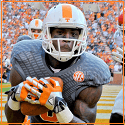|
Going with other sports... the Devil Rays finished in last place every year of their existence (except in 2004 they finished in 4th out of 5) They then changed their name and uniforms and immediately won the division and the AL Championship. They've finished 3rd, 1st, 2nd, and 3rd since.
|
|
|
|

|
| # ? Apr 25, 2024 21:01 |
|
Why is the coverage map website called "The 506"?
|
|
|
|
So what defines a defenseless player?
|
|
|
|
Kevyn posted:Why is the coverage map website called "The 506"? I think originally it was just some guy's homepage, and he called it The 506 because it was the area code for New Brunswick (where he lived). The coverage maps took off though, and basically took over the site.
|
|
|
|
Cate the Great posted:So what defines a defenseless player? A receiver in the act of catching the ball; the quarterback while in the pocket although i guess this might be a separate set of rules. Once a receiver possesses the ball he can't be defenseless. I'm sure Trin will have the full explanation
|
|
|
|
Cate the Great posted:So what defines a defenseless player? Both rulebooks have their own list of defenseless players; they are, of course, slightly different. NFL first, since they invented the concept. quote:Players in a defenseless posture are: These players have a special degree of protection; it is automatically illegal to do two things to them, and I'm going to paraphrase the relevant rules to be sure they're in intelligible English rather than Rulebookese. 1. Hit them in any part of their body while leading with your helmet. Helmet-to-chest and helmet-to-knee is every bit as much a foul when it's against a defenseless player as helmet-to-helmet. 2. Hit them in their head with any part of your body. Forearms, shoulders, whatever; it's all as verboten as helmet-to-helmet. There's a bit of a perception still lingering around that it's only helmet-to-helmet shots that are disallowed against a defenseless player, which just isn't true. Please note that 6 and 7 does not automatically mean that you can't ever touch the QB or the punter during a return. If they move to participate in the play you can block them, of course; but they're still deemed defenseless to stop #99 thinking "oh, he's moving towards the ballcarrier, tee hee, I can take his head off and it'll be legal". It also doesn't mean that those are the only ways you can foul a defenseless player; if you run up to the punt returner and push him in the chest before the ball arrives so he can't catch it, that's still a foul - it's just a foul for kick catch interference, not for illegally contacting a defenseless player. One more thing to note here; if you launch yourself off the ground to add power to your illegal hit on a defenseless player, most people now think this is a flagrant personal foul and you're getting ejected. Let's just take a look at the NCAA's list of defenseless players for comparison purposes, but everything (except the stuff about blindside blocks) that I just said counts on Saturday as well. quote:A defenseless player is one who because his physical position and focus of concentration is especially vulnerable to injury. Examples of defenseless players are: NCAA doesn't bother making it specifically illegal to take the head off the QB or punter on a return, but of course you could still call it under the "any other act of unnecessary roughness" clause. They do have "a player obviously out of the play" on this list, which is frankly unnecessary because if he's obviously out of the play, it's illegal to forcibly contact him in any way, never mind using your helmet or hitting him in the head. Also, pretty much the only thing that the NFL does better than NCAA on player safety is that they've adopted specific rules against blindsiding someone in the head; NCAA keeps whining that it's too hard to make a rule to define a blindside block, but from my perspective I'd be happy with whatever rule appeared, as long as it were possible to use it to make calls when dear old Gladys McAncient looks at a play through her binoculars from the last row of the upper tier of the stand and says "gee whillikers, he sure blindsided that kid good!" Hell, just tell the guys in a secret memo through the coordinators to start calling it under "any other act of unnecessary roughness", just do something about it already. Trin Tragula fucked around with this message at 11:08 on Dec 16, 2012 |
|
|
|
I notice that on punt returns (maybe kick offs too, but I just saw it on a punt in the Steelers Cowboys game) the referee behind the punt returner will throw down a blue coin/chip looking thing? What is this and what's it's purpose? I was guessing that the ref throws it where the ball lands but they always seem to do it yards behind where the ball is caught or bounces.
|
|
|
|
Bean bag. Marks spots that are not fouls, but we still need to know where they are (usually because they might turn into a penalty enforcement spot at some point). Watch out for them on fumbles as well.
|
|
|
|
Specifically on punts, they seem to be used where the punting team first contacts the ball downfield if the receiving team backs off of it. Confirm/deny?
|
|
|
|
Confirm. Each spot where they touch it is illegal touching by Team A, and as long as there are no enforced penalties, after the down Team B can elect to have the ball at any of those spots, so we need to know where they are. Generally we don't bag the spot where Team A actually possesses the ball, because there should be someone standing there with nothing better to do. (In practice, when there's multiple available spots the covering official just goes "right, what's the best spot for them?" and then puts the ball there without asking.)
|
|
|
|
Trin Tragula posted:Confirm. Each spot where they touch it is illegal touching by Team A, and as long as there are no enforced penalties, after the down Team B can elect to have the ball at any of those spots, so we need to know where they are. Generally we don't bag the spot where Team A actually possesses the ball, because there should be someone standing there with nothing better to do. (In practice, when there's multiple available spots the covering official just goes "right, what's the best spot for them?" and then puts the ball there without asking.) So this is explains why if a dude grabs the ball but slides into the endzone on a punt it's a touchback... I'd always thought it was where it's first touched, but the receiving team getting the best possible spot makes it make a whole lot more sense. Thanks!
|
|
|
|
Rooster Brooster posted:So this is explains why if a dude grabs the ball but slides into the endzone on a punt it's a touchback... I'd always thought it was where it's first touched, but the receiving team getting the best possible spot makes it make a whole lot more sense. Thanks! There is also a difference between college and NFL rules with that regard. I always get them confused, but I think in college its where the player is and in the NFL its where the ball is.
|
|
|
|
swickles posted:There is also a difference between college and NFL rules with that regard. I always get them confused, but I think in college its where the player is and in the NFL its where the ball is. Other way round - in the NFL if you're touching in the end zone and you stop the ball breaking the plane it's a touchback, and in NCAA you can't jump from the field and bat the ball out of the end zone to stop it being a touchback.
|
|
|
|
Kevyn posted:Going with other sports... Colorado Avalanche. They won the Stanley Cup the first year after being the Quebec Nordiques.
|
|
|
|
This may not be the thread for this, but I keep wondering what "replacement level" is. I see posts claiming that so and so is "below replacement level" is this some correlation to an advanced statistic, or just a new way of saying that the player is bad and needs to be replaced? Seems such a weird saying since every RB would be replacement level against AP right now. Who sets the benchmark?
|
|
|
|
I usually read it as "generic free agent player at that position."
|
|
|
|
SpclKen posted:This may not be the thread for this, but I keep wondering what "replacement level" is. I see posts claiming that so and so is "below replacement level" is this some correlation to an advanced statistic, or just a new way of saying that the player is bad and needs to be replaced? It's defined by looking at what players who would be considered "replacement level" in the past would perform at and then using that as a general baseline: http://www.fangraphs.com/library/index.php/misc/war/replacement-level/ Basically, it's like 20 runs below league average for 600 PA, and you kind of go from there. It's not rigorously defined though, I don't think.
|
|
|
|
"Below replacement level" roughly means that even if you don't have any other players on your team at that position, you could just go sign some random guy and he would be more effective. In baseball a "replacement" guy is a minor league player who is generally old enough that you know he's not going to be anything special. Teams have lots of these hanging around.
|
|
|
|
Wow that makes a lot more sense when used in the context of baseball. I was having a big issue with it in football because there are fewer players available and every fan has guys they think need to be replaced on their team, but there isn't the talent pool to get new players to just "plug" them in like there is in baseball. Sometimes your guy would be below replacement level, there just isn't anyone to replace him with until the draft.
|
|
|
|
Yeah, in football it's rougher because if nothing else, they likely aren't going to know your schemes / routes / have any repertoire with your quarterback. Which is why teams tend to bring in guys they had in training camp or on the team previously. That said, there's a ton of veterans, failed rookies and never-were's sitting by the phone that can all come in and give you 2 yards per carry if it's blocked for them or engage a blocker and never disengage it or suicide in on special teams that you can always replace the worst players.
|
|
|
|
Running back is the one position you can always find serviceable street free agents. As a pats fan I can say that safety and corner are not.
|
|
|
|
BIGFOOT PEE BED posted:Running back is the one position you can always find serviceable street free agents. As a pats fan I can say that safety and corner are not. The reason running backs are my favorite position in football is because just about anyone can be an ok HB, but the difference between an ok HB and a loving amazing HB is is just lightyears. To clarify: about 90% or so of a HB's yards can be attributed to good blocking. The last 10% though is all HB and incredible to watch.
|
|
|
|
Can someone explain the difference between run- blocking and pass-blocking when it comes to O-Line technique? My dumb logic is that run blocking involves more gap creation and pass blocking is more about keeping the pocket intact, but I really don't know the specifics about it, like why certain lines are great at one form of blocking over the other. To this layman it just looks like shoving a guy out of the way, I'd love to learn how the approaches differ.
|
|
|
|
You're really not far off. Run blocking is about forcibly moving defenders out of the way or trapping them via misdirection to create a hole or lane for the ball carrier to run through. This is often referred to as "power" vs "finesse" running, and various TV commentators will expound upon the virtues of either. The big thing to know is that a team can build an effective and powerful running game either way, if coached properly. Pass blocking is generally about diverting defenders away from the QB so that he has lanes to throw through/over without worrying about being steamrolled by 250 lbs of fury or getting his pass deflected at the line. There are still more differences between what's expected of an O-Line regarding a quick, short passing game vs a big-play, vertical passing game. In the NFL, the OLs are generally pretty solid at both. Coaches may emphasize one skill set or the other based on their play calling and personal philosophy, but it's generally accepted that to win in the pros you need to be able to both run and pass and that all starts with the line. Tackles are typically more prized for their pass protection since they tend to defend the most aggressive pass rushers and nobody wants their QB to be slaughtered on an unprotected blind-side shot. Interior linemen tend to be favored for run blocking because if they can open up a small hole that a backfield blocker (assume this includes a FB, H-Back or blocking TE) can blast through and destroy a LB, the RB has a chance for a huge play. What you end up with is (again, generally) huge behemoths on the end of the line to act as brick walls against pass rushers. There are more athletic, slightly smaller and more mobile brick walls at C and G to move around and create creases or holes for interior rushes, often assisted by a backfield blocker. It's like martial arts; what do you ultimately want to do to your opponent? If you just want him neutralized so something can travel past him in the air, you generally use shoving techniques to get him out of the way and protect your conveyance (QB). If you want to demoralize him and make him watch his goal (the football) travel past him time after time while he loses the ground he's trying to defend, you use a more brutal/strategic approach with the running game. This is another chapter in "Why Football Rules".
|
|
|
|
Also worth mentioning that pass blocking linemen need to have really good footwork, especially Tackles side-stepping to keep speed rushers in check or whatever. Sure, there's plenty of technique involved in the run game (cuts, traps, pulls etc) but pass blocking requires a lot more finesse and technique to be able to keep the pass rusher from doing what he wants to do. You can't necessarily blast forward into the defense like you can on run plays or you'll get spun right past. You have to be ready for the defensive guy to either make a move or just come straight at you with the intent to bowl you over. This is also the reason you hear commentators talking about how the O Linemen prefer running to passing. They'd (for the most part) rather come off their stance and barge forward than pull up and pass block.
|
|
|
|
I know they occasionally have Co-MVPs in the NFL, but a quick check of Wiki shows that there's never been a co-DPotY. If, say JJ Watt and Aldon Smith both get the sack record this season, is there a chance that they could split that? Is that something that they can do?
|
|
|
|
Dey Yah posted:I know they occasionally have Co-MVPs in the NFL, but a quick check of Wiki shows that there's never been a co-DPotY. If, say JJ Watt and Aldon Smith both get the sack record this season, is there a chance that they could split that? Is that something that they can do? I believe it's just a matter of luck, if the votes end up in a tie then you have co-whatevers. I don't think a voter can split his vote and say both guys are #1 for instance.
|
|
|
|
In the Ravens - Giants game, a pass was ruled incomplete with the reasoning given that there was no second action. Can anyone explain what this means since I'd never heard the term before.
|
|
|
|
MonsterUnderYourBed posted:In the Ravens - Giants game, a pass was ruled incomplete with the reasoning given that there was no second action. Can anyone explain what this means since I'd never heard the term before. In order to be considered in control of the ball, the rules state that the receiver must make a "football move" (whatever the hell that is) after catching it, so as to demonstrate that they themselves consider the ball caught and are now going to run, pivot, jump, or whatever to further progress the ball down the field. At that point, if the ball falls out of his hands, it's ruled a fumble and either team can recover. If, on the other hand, the player never makes this so-called "football move" with the ball, they have not demonstrated control of the ball and it is ruled instead as simply a dropped ball and therefore incomplete pass.
|
|
|
|
Deteriorata posted:In order to be considered in control of the ball, the rules state that the receiver must make a "football move" (whatever the hell that is) after catching it, so as to demonstrate that they themselves consider the ball caught and are now going to run, pivot, jump, or whatever to further progress the ball down the field. I am not convinced that this 'football move' language is actually in the rulebook. Here is the only thing I could find: “A forward pass is complete (by the offense) or intercepted (by the defense) if a player, who is inbounds: (a) secures control of the ball in his hands or arms prior to the ball touching the ground; and (b) touches the ground inbounds with both feet or with any part of his body other than his hands; and (c) maintains control of the ball long enough, after (a) and (b) have been fulfilled, to enable him to perform any act common to the game (i.e., maintaining control long enough to pitch it, pass it, advance with it, or avoid or ward off an opponent, etc.).” So we have 'an act common to the game' which is then further defined parenthetically. Seems like a quibble, but to me 'an act common to the game' is different from 'a football move'. Somehow. This 'second act' I'm pretty sure is some bullshit that one particular referee used in an explanation literally one time, and now we're all cursed with it. It seems to me that the rules governing possession after a catch are the least understood, and even worse, most widely MIS-understood, (with great conviction of course) by everyone. Especially announcers. I would love to hear from Trin. Detiorata made a good explanation except for that one unfortunate phrase, and his explanation accords with my tortured understanding.
|
|
|
|
Larch posted:So we have 'an act common to the game' which is then further defined parenthetically. Seems like a quibble, but to me 'an act common to the game' is different from 'a football move'. Somehow. So are you arguing that the "game" in question might actually be baseball, and therefore it might be interpreted as a "baseball move"? This is semantic nitpicking. "Football move" is a colloquialism used by announcers in explaining the rule, rather than spinning out the literal legalese of the official rule.
|
|
|
|
Dey Yah posted:I know they occasionally have Co-MVPs in the NFL, but a quick check of Wiki shows that there's never been a co-DPotY. If, say JJ Watt and Aldon Smith both get the sack record this season, is there a chance that they could split that? Is that something that they can do? I think the last two weeks have demonstrated that Watt solely deserves the award over Aldon. Smith is an amazing pass rusher, no doubt. I would absolutely rather have him than Bruce Irvin. That said, without Justin Smith he seems to have been dramatically exposed. JJ Watt, on the other hand, seems to be making his plays through his own ability and not the scheme helping him out. He is also doing it from a position that does not normally record record sacks. (lol record record) Plus Watt is a threat to bat down passes as well.
|
|
|
|
I believe "football move" used to actually be in the rule book until recently, now it's "an act common to the game" but it's the same sentiment.
|
|
|
|
What happens in the case of a player going down in the action of receiving, how is control determined if the player is unable to perform an act common to the game because they are already down? Is it a "feels right" combination of time ball is held and level of control exerted on the direction of the ball?
|
|
|
|
MonsterUnderYourBed posted:What happens in the case of a player going down in the action of receiving, how is control determined if the player is unable to perform an act common to the game because they are already down? Is it a "feels right" combination of time ball is held and level of control exerted on the direction of the ball? He just has to maintain possession all the way to the ground in that case (without the ground helping him catch it). The "football move" clause is there to help refs distinguish between a catch and a fumble versus an incomplete pass.
|
|
|
|
I'm saying that those words don't appear in the rulebook, and that other, slightly different words do appear. It's not a personal attack on you. I just think that greater understanding becomes more likely when the text of the actual rules is known. This greater understanding then leads to more useful discussion. 'An act common to the game' has a more precise scope than 'a football move'. It is clearer language. We can see how a lack of clarity persists and is magnified in your post that I was replying to, where you write about how 'the rules state ..."a football move"...' So you put 'a football move' in quotes as though it came straight out of the rulebook, which it does not. Now you say that this is a handy way for announcers to clarify the difficult 'legalese' of the actual words 'act common to the game'. Which leaves the question of why you characterized it as coming from the rulebook and put it in quotes since you seem to know that this isn't the case. But leaving aside your manifest duplicity, I still think that 'an act common to the game' is more easily and narrowly defined than 'a football move'. It's still pretty muddy though, and we can see why that one ref (I think it was Steratore) brought up this 'second act', and also this 'element of time' we keep hearing about. It's basically a big loving mess and I'm pretty sure it's going to stay that way. Larch fucked around with this message at 06:13 on Dec 26, 2012 |
|
|
|
Larch posted:I'm saying that those words don't appear in the rulebook, and that other, slightly different words do appear. It's not a personal attack on you. I just think that greater understanding becomes more likely when the text of the actual rules is known. This greater understanding then leads to more useful discussion. No, I put "a football move" in quotes to indicate it was a euphemism. You're trying to pretend a difference exists when in fact there isn't any. Your quibbling over this is unworthy of a king.
|
|
|
|
Deteriorata posted:In order to be considered in control of the ball, the rules state that the receiver must make a "football move" (whatever the hell that is) after catching it, so as to demonstrate that they themselves consider the ball caught and are now going to run, pivot, jump, or whatever to further progress the ball down the field. So there's your post. Your exact words are 'the rules state that the receiver must make a "football move"' 2 posts later you admit that it's a colloquialism, and now a euphemism. Regardless of which of those two things you think it is, it clearly is NOT the wording of the actual rule. The actual wording is murky enough, and what I'm saying is that it's clarity is in no way enhanced through this alteration. Commentators are great, they can add drama like Gus, or show you things you may have missed like Madden used to do and like Collinsworth and Mayock and Gruden try to do now. They can offer interesting historical anecdotes illustrating this or that, or simply report facts about current players or coaches that you may not have known, and all of this is great. One thing that I don't think they do very well at all, is clarify rules. Why you would choose to use their phrase and then cling to it is a complete mystery to me. And I choose to quibble over it because this rule keeps coming up, and I have begun to feel as though nobody has any idea what the gently caress they're talking about when they talk about it, which is very irritating but also amusing. I intend to keep quibbling about it. You should think about using the language from the rulebook when you write 'the rules state', and when you want to write about what the commentators say, then write 'the commentators state'. That is called clarity. None of this is helping us get closer to an understanding of when exactly possession of the ball is determined to exist after the act of a catch. Again the actual alleged text is: “A forward pass is complete (by the offense) or intercepted (by the defense) if a player, who is inbounds: (a) secures control of the ball in his hands or arms prior to the ball touching the ground; and (b) touches the ground inbounds with both feet or with any part of his body other than his hands; and (c) maintains control of the ball long enough, after (a) and (b) have been fulfilled, to enable him to perform any act common to the game (i.e., maintaining control long enough to pitch it, pass it, advance with it, or avoid or ward off an opponent, etc.).” So I guess the real confusion stems from 'long enough' and it is from these two words that the phrase 'an element of time' originates. I keep hearing about this element of time and this must be why. An element of time long enough for an act common to the game to be performed. Thinking about this language it's easy to see how we get to 'a second act' and 'a football move'. It's entirely too subjective in my opinion. It seems like simply defining 'long enough' as 2 seconds or something would remove all confusion.
|
|
|
|
As Trin will tell you, technically correct is the best kind of correct.
|
|
|
|

|
| # ? Apr 25, 2024 21:01 |
|
Yo big L dawg: What the gently caress are you going on about and why do you think it matters in the least? Aside from the obvious; typing to chase away the bitter feelings of loneliness on this joyous holiday.
|
|
|
































